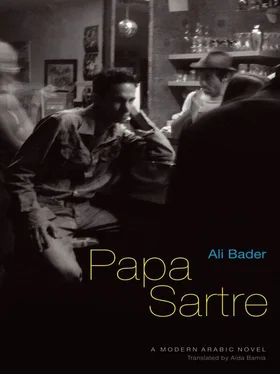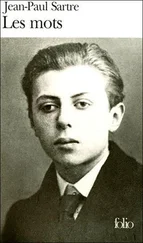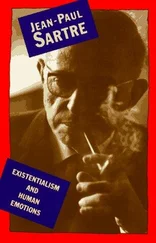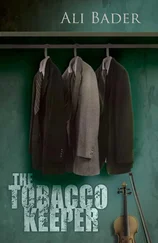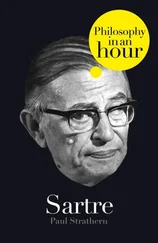43
Rujina had come to the house after Abd al-Rahman’s mother fired the previous maid. Saadun brought her, and it gradually emerged that he had a relationship with her. The philosopher’s father learned of their relationship but didn’t mind as long as it didn’t interfere with their work.
Rujina came from a Christian village north of Mosul. It was a rather primitive place, but she was not lacking in taste and refinement. She transformed the house into an impeccably clean and attractive residence. When he learned of her relationship with Saadun, Abd al-Rahman became attached to her. He was attracted by sinful urges that he found fascinating. He wanted to spy on her while she was in the bathroom or in her bedroom. He wanted to savor that body that had stirred something in him the day he watched her as she was cleaning the stairs.
Her eyes disturbed him and made it impossible for him to look straight at her. He cared more for her than he did for his own mother. He wanted to forget the horrible sight he had spied in his parents’ bedroom. He wanted to regain his state of grace without sin. He began establishing a comparison between his mother’s lovemaking with his father, a sin in his eyes, and Rujina’s sinful life. He became enamored of the evil spirit, the evil and sin, when he heard Rujina’s seductive story about her adulterous relationship in Talkif, her village.
44
Rujina was the daughter of Yusif, the owner of a bar on the outskirts of the village. She had been in love with Yaqo since adolescence, and he used to take her to a distant walnut tree to mess around. She was completely seduced by this son of a thief, whose father had come to Talkif thirty years ago from the village of Inshki. He bought large plots of land between Talkif and Betnaya. When he was murdered, his only son, Yaqo, inherited all his property. The young man was handsome but cruel and heartless, and intent on exercising his control over all the inhabitants of Talkif. If any one of them became too powerful, Yaqo bought up his property and threw him out of the village.
45
One day Yaqo went to Yusif’s bar and began drinking. He told the owner that he wanted to buy the bar, took out his purse, and placed it on the counter. Yusif refused to sell and asked Yaqo to leave. “Do you know who you’re talking to?” asked Yaqo. Yusif responded, in front of everyone present, by spitting in Yaqo’s face. Yaqo went after him with a bottle of arrack, but the waiters intervened. Yaqo threatened Yusif angrily, telling him, “I will rape your daughter and spit on your face.”
Two days later Rujina ran away from home and went to Yaqo’s house with the help of Saadun, who used to look after Yaqo’s horses. She gave herself to the rich landowner, and Saadun broadcast the news of Yaqo and Rujina’s marriage to the whole village the following Sunday. When Yusif heard the news, he closed his bar and went home. He collapsed on the front steps and died of consternation on his daughter’s wedding day.
46
Two months after the wedding Yaqo lost interest in Rujina and began spending time with a mistress. He left Saadun in charge of his household and horses while he took to drinking and gambling.
Rujina became Saadun’s mistress and received him openly in her bedroom. He had a good deal for sure: enjoying the land, money, and Rujina. It became known throughout the village that Rujina had a Muslim lover. Her cousin Michael was furious and tried to kill Saadun, but the shot only hit him in the shoulder. Fearing for his life, Saadun ran away, never to be seen again, while Michael stayed on Yaqo’s property to protect Rujina.
One day Michael got drunk and saw Rujina half naked in her room; he tried to rape her, but she pushed him away and hit him over the head with an iron bar. Before he died, Michael confessed to the investigator that Rujina had acted in self-defense when he tried to rape her. Rujina was released from prison and left Talkif for good. She took the first train to Baghdad, where Saadun was waiting for her.
Saadun took Rujina to his employer’s house, and the same evening he recommended her as the new maid. From that day forward Rujina worked as a housemaid for the respectable Amin Shawkat. There she stirred the passions of the young boy who was growing up before her eyes. She was aware of the limits of his sexuality, however, and increased the dosage gradually. From his encounters with her he concluded that this woman was greater than the pure woman and the tainted woman superior to the clean woman. The woman who prostituted herself was far greater than the white dove. Abd al-Rahman was more familiar with the physicality of tainted creatures, and they inspired his thinking.
47
One day, as Abd al-Rahman was going downstairs, he heard the sound of the servants’ shower near the kitchen. He guessed that Rujina was taking a shower, and this motivated him to go to the door. His heart was racing. He was torn between desire and panic, and fearful of being caught he almost ran away. Curiosity prevailed. He peeped through the keyhole and saw Rujina under the shower, her naked body luxuriating under the hot water. He stared at her round breasts, her dark nipples, where he knew the pleasure was. The sight of her smooth thighs, slim legs, and delicate hips excited him, and he struggled to see more through the narrow keyhole. Suddenly he heard a noise close by, and when he turned his head he saw Saadun smiling at him. Embarrassed, he tried to justify his being there, “I was trying to find out who was in the bathroom.”
“I want to know too,” said Saadun, still smiling, then pushed the boy aside and looked through the keyhole. He knocked three times, and Rujina let him in and locked the door behind him. Abd al-Rahman wanted to run away and hide in his room, but when he heard the sound of the running water and the moans of pleasure coming from behind the door he peeped through the keyhole again and saw the two naked bodies touching gently under the hot water, surrounded by white steam.
48
He often recalled the exciting scene he had glimpsed through the keyhole. It was a fascinating image that remained forever embedded in his mind. Such vivid images fueled his imagination and were revived every time he showered.
49
Saadun, the carriage driver, was a very elegant man. His clothes were old and worn from frequent ironing, but they were clean. His thick hair had a few streaks of white, but his mustache was black. His piercing gaze and stern features made a strong impact. One day a relative of the family saw him leaving the garden in the direction of the stable, carrying a tray. She asked the lady of the house about him, “It’s Saadun. He looks after our horses.” The woman laughed loudly, “He has the face of a master and does the work of a servant.”
50
After the bathroom incident the young boy became attached to Saadun. They often went on walks and outings together, and Abd al-Rahman liked Saadun’s proud demeanor, his eloquence, and his ability to seize an opportunity without hesitation. Those were qualities he himself lacked.
One day Abd al-Rahman was out walking in the garden when he saw Saadun washing his hands, preparing to go out. Saadun smiled at the boy, opened the main door, and left. The boy ran after him and asked him where he was going.
“Would you like to come along?” asked Saadun.
“Yes,” replied the boy.
“Go tell your father that you’re coming with me.” Abd alRahman’s father, wearing his traditional clothes, was observing the scene from the second floor balcony. Before the boy spoke the father nodded his head approvingly.
51
The two walked together through the muddy path that separated the house gardens from the surrounding fields. Saadun was whistling and walked fast, taking long steps, his hands in his pockets. The boy hurried behind, stopping every now and then to remove a pebble or a piece of fruit that had fallen from a tree. When they reached the main road, they headed toward the city drainage stations, where many fellahin fleeing the harshness of their feudalistic masters had established a shantytown. They came to the city looking for work as unskilled laborers, shoeshine boys, cigarette vendors, hawkers, gardeners, or café servers. The Baghdadis called them al-Shuruqiya.
Читать дальше
